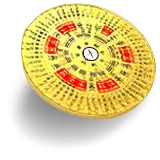Understanding Qi Flow in Feng Shui
In Feng Shui, Qi (pronounced 'chee') is the life force or energy that flows through everything in the universe, including our homes, workplaces, and bodies. The quality of Qi flow within a space directly impacts our well-being, happiness, and success. A harmonious flow of Qi can promote health, wealth, and prosperity, while stagnant or disrupted Qi can lead to imbalances that negatively affect our lives. Understanding how to optimize the flow of Qi in your environment is a fundamental principle of Feng Shui and can help you create a more balanced and peaceful living space.
What is Qi?
Qi is often described as the invisible energy that permeates all things. It is present in the air we breathe, the food we eat, and the spaces we inhabit. In traditional Chinese philosophy, Qi is the vital force that sustains life and keeps everything in balance. When Qi flows freely and harmoniously, it fosters a sense of well-being, vitality, and positivity. Conversely, when Qi is blocked or disrupted, it can lead to feelings of unease, stress, and discomfort.
In Feng Shui, Qi is believed to move through the environment in both visible and invisible ways. It enters a space through windows and doors and moves through the rooms, interacting with furniture, colors, and other design elements. The goal of Feng Shui is to ensure that this energy flows smoothly and without obstruction, creating a positive and supportive environment.
The Importance of Qi Flow
The flow of Qi within a space is crucial to creating an environment that supports health, happiness, and success. When Qi flows smoothly, it nourishes every part of the space and the people who live or work in it. Positive Qi brings a sense of peace, clarity, and vitality, helping you feel more energized and focused.
On the other hand, stagnant or disrupted Qi can create a feeling of heaviness or discomfort. This is often the result of clutter, poor room layout, or obstacles that block the natural flow of energy. In such environments, people may experience a lack of motivation, fatigue, or even physical health problems.
Enhance Qi Flow in Your Home
There are several ways to optimize the flow of Qi in your home, many of which involve simple changes to your surroundings. Here are some key basic Feng Shui tips to help improve the flow of Qi in your space:
- Declutter Your Space: Clutter is one of the most common causes of blocked Qi. When there is too much stuff in a space, it can prevent energy from flowing freely. To enhance Qi flow, start by decluttering your home. Remove items you no longer need or use, and organize your belongings to create a sense of openness and clarity.
- Pay Attention to Entryways: In Feng Shui, doors and windows are known as the 'mouth of Qi' because they are the primary points where energy enters and exits a space. Make sure that your front door is clean, well-maintained, and free from obstructions. A cluttered or blocked entryway can prevent positive energy from entering your home. Additionally, keep windows clean and open to allow fresh air and natural light to circulate.
- Furniture Placement: The way you arrange your furniture can significantly affect the flow of Qi. Avoid placing furniture in a way that creates obstacles or blocks natural pathways in your home. For example, ensure that there is enough space for Qi to flow around your bed, sofa, and dining table. In living areas, arrange seating in a way that encourages conversation and connection, as this promotes a harmonious energy flow.
- Incorporate Natural Elements: Bringing nature into your home is a powerful way to enhance Qi flow. Plants, water features, and natural materials like wood and stone can help to balance the energy in a space. Indoor plants, in particular, are known to improve air quality and introduce vibrant, living energy into a room. Be mindful of the placement of plants and water elements, as they should support the flow of energy rather than disrupt it.
- Balance Yin and Yang: Yin and Yang represent the opposing but complementary forces that exist in all things. In Feng Shui, it is important to maintain a balance between these two energies to create harmony in your home. Yin energy is associated with calmness, rest, and relaxation, while Yang energy is linked to activity, brightness, and stimulation. Achieving a balance between these energies in your home—through lighting, color choices, and room functions—will promote a harmonious Qi flow.
- Address Sharp Corners: Sharp corners or 'poison arrows' can create negative Qi, as they can cause energy to move too quickly or aggressively through a space. Soften the impact of sharp corners by adding plants, using round furniture, or placing decorative objects that diffuse harsh angles. This will help slow down the energy flow and create a more gentle, peaceful environment.
Understanding and enhancing the flow of Qi is essential to creating a harmonious living space that supports health, well-being, and success. By making simple adjustments such as decluttering, paying attention to entryways, and incorporating natural elements, you can optimize the energy in your home and invite more positivity into your life. Feng Shui is not just about arranging furniture—it's about creating an environment where energy flows freely, supporting every aspect of your life. In 2025 and beyond, embracing the principles of Feng Shui can help you cultivate a balanced, peaceful, and prosperous future.

